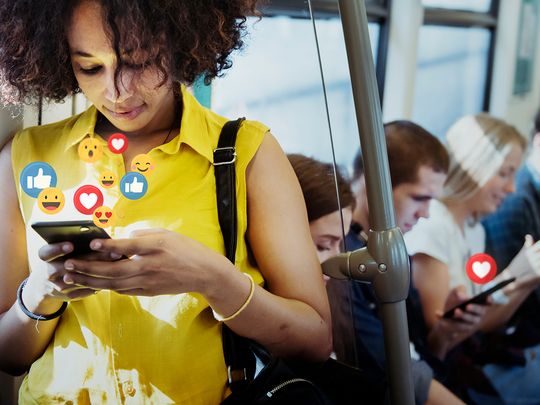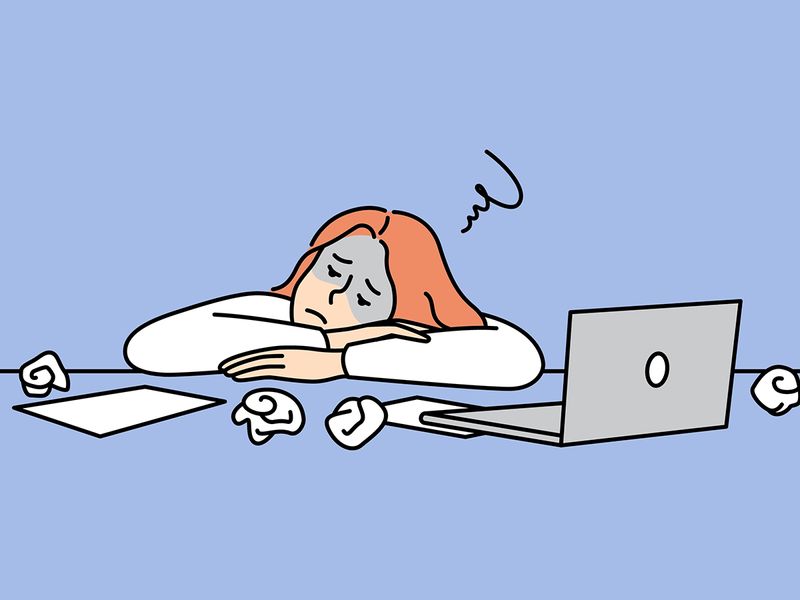
Social media is a diary, except that most of the time, the diary writes back to you too.
Some of the oversharers are proud of writing freely in this expansive, infinite space. It has saved them, as Dubai-based Ilse Byrn an Irish expat and marketing professional frankly says. She shares several posts during the day, including photos of her meals, and the books she reads. However, she also has a different account that she prefers to keep anonymous.
Here, she shares her difficult struggles with mental health. She started documenting her journey from 2019, which included the frequent bouts of depression and phases of anxiety. “I found so much support on that account, and it really helped me. It gives me strength to keep going,” she says, admitting that she has deleted older posts, as some of it is too painful to her. She feared sharing it from her original account, for many reasons. “You never know who uses what against you,” she says. “I don’t want to be gossiped about,” she adds.
Many appreciate the constant posting on social media; it can be empowering, or a way of absorbing a stranger into your life, without doing so. Others tend to label it as attention-seeking. There seems to be a confusion on how much a person can post on social media. One Egyptian Dubai-based expat who would prefer to remain anonymous, rather fretfully recalls how she’s “sick and tired” of her friend recording everything they do and posting it on Instagram. “It’s like being on a reality show,” she says rather gloomily.
The opinions about oversharing are divisive. What is it really, and when does it become a problem?
The many definitions and understandings of oversharing

What really constitutes oversharing and when does it become a problem? Last year, a paper from the American academic peer-reviewed journal Psychological Reports titled Oversharing on Social Media: Anxiety, Attention-Seeking, and Social Media Addiction Predict the Breadth and Depth of Sharing, published the first psychological scale to measure oversharing. The researchers put together a questionnaire for teenagers and asked how much of their thoughts, emotions, and life events they share online. The study discovered ‘troubling’ states with those who shared too much online, and questioned why people post about their lives at all, according to The Guardian.
The definition of oversharing seems fluid. In 2012, a psychology paper titled Front and backstage in social media, dubbed it as “excessive generosity with information about one’s private life or the private lives of others". The paper was published in the British peer-reviewed journal, Language, Discourse and Society.
The key word is ‘excessive’. Elaborating more on this, Diana Sullivan, an American Abu Dhabi-based psychologist, and wellness expert says, “A very common understanding of oversharing on social media is constantly posting excessive amounts of information. When you keep sharing personal, and intimate details of your life, and seek validation from this endless space, that’s considered oversharing. Offline or online, it can make a person uncomfortable, generating a sense of awkwardness between people. Moreover, the ‘oversharer’ feels that they said too much,” she explains.
However, this is entirely subjective: What one person could perceive as sharing, could be seen as oversharing by someone else, adds Sullivan. “Everyone has different ideas on what is considered ‘normal’ to share,” she says. Ironically, some of us wouldn’t have a problem with a friend constantly sharing online about their anxieties; yet we would judge someone else for doing so and call it oversharing. “Essentially, people’s ideas of what is too much, is entirely personal,” she adds.
Sadfishing
The reason why oversharing is often viewed negatively, is because people believe that the oversharer is ‘sadfishing’. “People think that when another person keeps sharing their troubles online, they’re trying to seek sympathy,” she says. “For example, someone sharing constant details from their hospital visits can seem very annoying to some, as they think that the person just wants attention.”
Yet, as she explains, a person dubbed as “seeking attention” is also trying to say something. What needs are not being met?
A way of ‘filling a void’

Loneliness. Many people have a pervasive sense of loneliness, which is why they resort to social media to fill a void.
However, instead of demonising those who choose to “overshare”, we need to see what they’re really trying to say, rather than dismissing it as attention-seeking.

When loneliness takes over or we are feeling a little lost, we tend to get fixated in unhealthy coping strategies by trying to find connection in scrolling or over posting to fill this void. We may do this even in a room full of people, but still feel alone and use social media to try to feel a connection to others...
As Charlotte Spurway, a Dubai-based psychologist explains, it’s a manner of filling a certain void. “Oversharing all depends on a person’s boundaries. Regardless of whether it is online or not, people tend to sabotage their own boundaries by constantly sharing their emotional troubles, because they feel a sense of loneliness and could have a low sense of self-esteem,” she says.
“When loneliness takes over or we are feeling a little lost, we tend to get fixated in unhealthy coping strategies by trying to find connection in scrolling or over posting to feel this void. We may do this even in a room full of people, but still feel alone and use social media to try to feel connections to others,” she says.

Some paint their lives differently online as a form of overcompensation for their own loneliness. Others look at their posts and have a fear of missing out...it creates a general sense of loneliness.
Sometimes, people want to paint their lives more glamorous than they are, explains Monica Mahi Mathijs, a Dubai-based wellness expert and emotional intelligence practitioner. They believe that it masks their actual feeling of loneliness; so, the excessive posting serves as compensation. And the cycle continues, as others keep scrolling through their posts and experience a further sense of loneliness, wishing they could emulate such a lifestyle And so, they try to do the same. "They have a sense of fear of missing out," says Mathijs.

This regular, habitual use of social media can also mean we feel lonely and disconnected from others. “It’s a form of craving emotional intimacy and emotional connection,” she says. Posting about their lives can also increase people’s self-esteem, she says.
And many a times, social media does give back: The person also receives support and help, which can help them through a depressive phase. However, the problem intensifies when a person just permanently lives for social media validation, as Sullivan explains, rather than doing any internal mental work. The problem is when you start replacing social media with actual interpersonal relationships. “When we rely on social media as a form of emotional intimacy or connection, it tends to be because we are experiencing a deficit in our real relationships, whether that's friends, romantic partners or family,” she explains.
There needs to be a balance, as she says.
Using social media wisely
The debates around oversharing on social media continue. It’s a space that helps people come forward with their problems and making some impact, yet people can be judged for doing so. It’s a double-edged sword, as Sullivan says. Yet, the problem doesn’t quite lie with social media as Spurway points out: It depends on the person themselves.
“If you think that you have posted too much on social media, you need to check in with yourself. What’s really going on? Are you struggling to sit with your uncomfortable emotions alone,” she asks.

Before posting on social media, ask yourself several questions: If I receive criticism for sharing this, am I prepared to constructively discuss and defend or ignore it?
Of course, the complicated emotional reasons aside, Spurway does advise that one generally needs to be a little careful on what they say in the social media space. “You are also talking to strangers that you do not know; so, you genuinely need to exercise caution, as things can be taken out of context and misinterpreted,” she says.
Andrea Skerritt, the founder of Xtempo Communications and has 17 years worth of experience in the communications sector, provides a checklist. "To establish your boundaries and determine where your oversharing line sits, ask yourself these questions before posting on social media," she says.
• Is this an aspect of my life that is sacred to me? Is this a part of my world that I want to protect?
• Is this something that others might learn from? Is it something followers might find valuable and enlightening?
• Does sharing this make me uncomfortable? Does it feel authentic to who I am and what I believe?
• Does sharing this bring me joy? Does it align with my purpose?
• If I receive criticism for sharing this, am I prepared to constructively discuss and defend or ignore it?
• Is there a chance this could compromise my short-term or long-term life goals?









